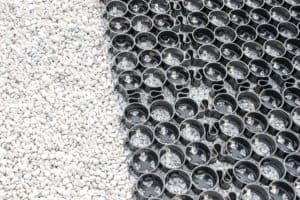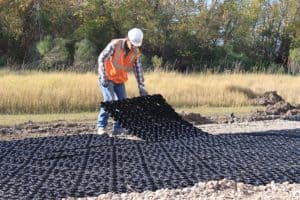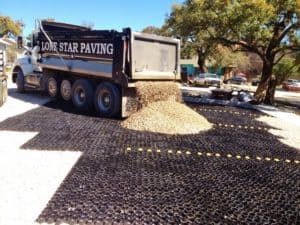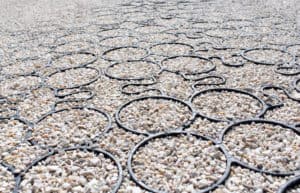Providing accessible and convenient parking for customers is a necessity for any business—from small, family-owned restaurants and stores to the largest commercial retailers. Building a new parking lot can be an expensive proposition, especially when factors like proper drainage systems and long-term maintenance are considered.
Traditional paving materials, like concrete and asphalt, can be expensive to install and require plenty of maintenance as they age. In comparison, permeable pavers initially tend to cost significantly less than concrete, and although they are cost competitive to asphalt paving systems, permeable pavers don’t require the expensive drainage systems or significant long-term maintenance that asphalt does.
Here are five ways permeable pavers can help your business reduce parking lot design costs:
Permeable Paver Cost
1) Lower Material Costs

Permeable pavers use a combination of interlocking grids that are laid over a prepared subsurface and one of several fill materials, such as gravel or crushed limestone. Once the fill material is compacted into the grids, it creates a strong, durable parking surface that is virtually maintenance free.
Between the grids and the fill material, the cost of materials tends to be far less than concrete and similar to asphalt. Additionally, because the fill materials are acquired locally, shipping costs are greatly reduced compared to the price of transporting asphalt or concrete materials to the site.
2) Reduced Labor Costs
To install an asphalt parking surface, a large team is needed to run the paving equipment, transport the materials, and finish the surface. With concrete surfaces, a similarly large team is needed to transport the materials, erect forms, pour the concrete, and finish the surface. In both cases, the crews must be experienced and knowledgeable in order to do the job properly, and combined with the long installation times that are required for each surface, this leads to high labor costs.

With permeable pavers, the installation process is quick and easy. After a suitable subsurface is created from compacted rock or limestone, the individual paving grids are laid over the surface and locked into place. Because the grids are extremely lightweight and cover a large area, the process goes very quickly. Afterward, the fill material can be spread, installed, and compacted by heavy equipment, such as a wheel loader. Overall, the installation process is much faster, and it requires fewer skilled laborers, reducing overall labor costs compared to concrete or asphalt installations.
3) Reduced Equipment Costs

Anytime specialized equipment is required, such as paving machines, concrete trucks or rollers, the price of the job can increase significantly. Companies often charge over a hundred dollars an hour per piece of heavy equipment, which adds up quickly. With asphalt paving, there are several pieces of heavy equipment involved, including pavers, rollers, dump trucks, and more, depending on the job. Concrete installations require several concrete trucks, and they occasionally require pump trucks and smaller equipment. Such equipment increases the installation costs.
With permeable pavers, the amount of equipment is minimized.
Often the same dump trucks and loaders that installed the subsurface can be used to acquire and install the fill materials. Because less specialized equipment and fewer operators are required, the installation costs for permeable pavers tend to be lower than concrete or asphalt.
4) Reduced Maintenance Costs
Asphalt and concrete surfaces need a way to divert and control stormwater during inclement weather to avoid flooding the parking lot, eroding the surface, polluting nearby areas with runoff, or causing erosion of the soil in the surrounding areas. In order to control the runoff during storms, a large and expensive drain system must be built below the parking surface. This drain system would need to include storm drains, a system of pipes, and connections to either a municipal wastewater system or a detention pool. Not only does this increase the initial cost of the installation, but the required ongoing maintenance of the drain system also increases the long-term costs of the parking surface.

Permeable pavers feature a porous surface, which allows precipitation to naturally drain through to the subsurface. This stops the parking lot from flooding during heavy rain. It also produces less runoff that can erode the surface of the parking lot or nearby soil and carry pollutants into surrou
nding areas. This allows the water to refill the local aquifers naturally, and it requires no ongoing maintenance as standard drain systems do. By eliminating the drain system completely, permeable pavers cost significantly less to install and maintain.
5) Lower Long-Term Costs
Asphalt surfaces are extremely soft, especially during hot weather, and can easily crack or develop potholes. Overtime, the sealant also degrades, allowing the surface to erode away quicker. To keep an asphalt parking surface in good condition, any holes or cracks need to be filled periodically, and the entire surface must be resealed often.
Concrete surfaces are also prone to cracking and upheaval, especially in areas where frost occurs. Additionally, like asphalt, the surface also needs periodic resealing to avoid erosion. To repair cracks or other damage in concrete surfaces, the damaged areas must be removed or ground down and new cement or concrete must be poured to create a smooth surface. And, finally, both concrete and asphalt systems must have the drain system periodically cleaned to avoid clogs, as well as have any leaking pipes or damaged drains replaced. This ongoing maintenance significantly increases the long-term costs of concrete or asphalt paving systems.

Permeable pavers create a strong, durable parking surface that has a similar lifespan to concrete or asphalt surfaces, but because the surface is flexible and porous and the fill material is securely contained within the interlocking grids, a parking surface made from permeable pavers requires very little ongoing maintenance, which reduces long-term costs.
Benefits of Permeable Pavers
Permeable pavers are a cost-effective, low-maintenance alternative to both concrete and asphalt surfaces, and with their porous design, locally sourced fill materials, and lightweight design made from recycled plastics, they are also environmentally-friendly and can help your project qualify for LEED certification.
Sources:



